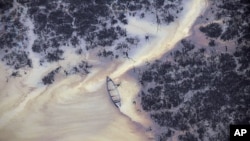A landmark study by the United Nations Environment Program reveals that pollution from more than 50 years of oil operations in a part of the Nigeria's Delta region has led to severe and widespread oil contamination that endangers local populations.
It could take 30 years and an initial investment of $1 billion to clean up the more than 1,000-square-kilometer homeland of the Ogoni people in Nigeria's oil-producing Delta region.
That's what the U.N. Environment Program has concluded after two years of what it called its most complex and comprehensive environmental survey ever.
Dangerous levels of hydrocarbons
The agency, also known as UNEP, found that massive oil pollution has devastated farming and fishing industries in Ogoniland and said communities are exposed on a daily basis to dangerous levels of hydrocarbons, including cancer-causing benzene, in the air they breathe and the water they drink.
UNEP's Policy Implementation Director, Ibrahima Thiaw, said oil spills that cause fires and damage vegetation also continue with alarming frequency and illegal artisanal oil refining has rapidly grown in the area in the past two years.
"The conclusion of this report is that the cleanup efforts undertaken to date are inadequate and have not resulted in environmental restoration. Clearly, overlapping authorities and responsibilities between ministries and lack of resources within key agencies has had serious implications for environmental management on the ground, including enforcement," said Thiaw.
Shell oil company, which operated in Ogoniland from the 1950s until 1993, paid for the study which was requested by the Nigerian government.
"Wake-up call"
Amnesty International called the report a "wake-up call," saying it revealed a "systemic failure" by Shell to address oil spills, something local communities and rights groups have accused it of for decades.
Shell has blamed spills on sabotaged pipelines and criminality but earlier this week accepted responsibility for two major spills in Ogoniland in 2008 and 2009.
Ogoniland's traditional leader, King Godwin Gininwa, told VOA that the UNEP study is a first step toward reconciliation between local communities and oil companies.
President gives assurances
Nigerian president Goodluck Jonathan, himself a native of the Delta, offered assurances that the government will act on the study's findings and that international support would continue to get a clean-up underway.
"The environmental challenges we have are as severe as the civil wars we have had. Environmental challenges, environmental pollution are probably even more critical because pollutants can migrant to any direction that you don't even expect," he said.
Though it could take up to three decades to restore heavily-impacted mangroves and swamplands, UNEP said individual contaminated areas could be cleaned up in as little as five years. It said immediate measures like marking contaminated zones and wells could go a long way to safeguard residents' health.




